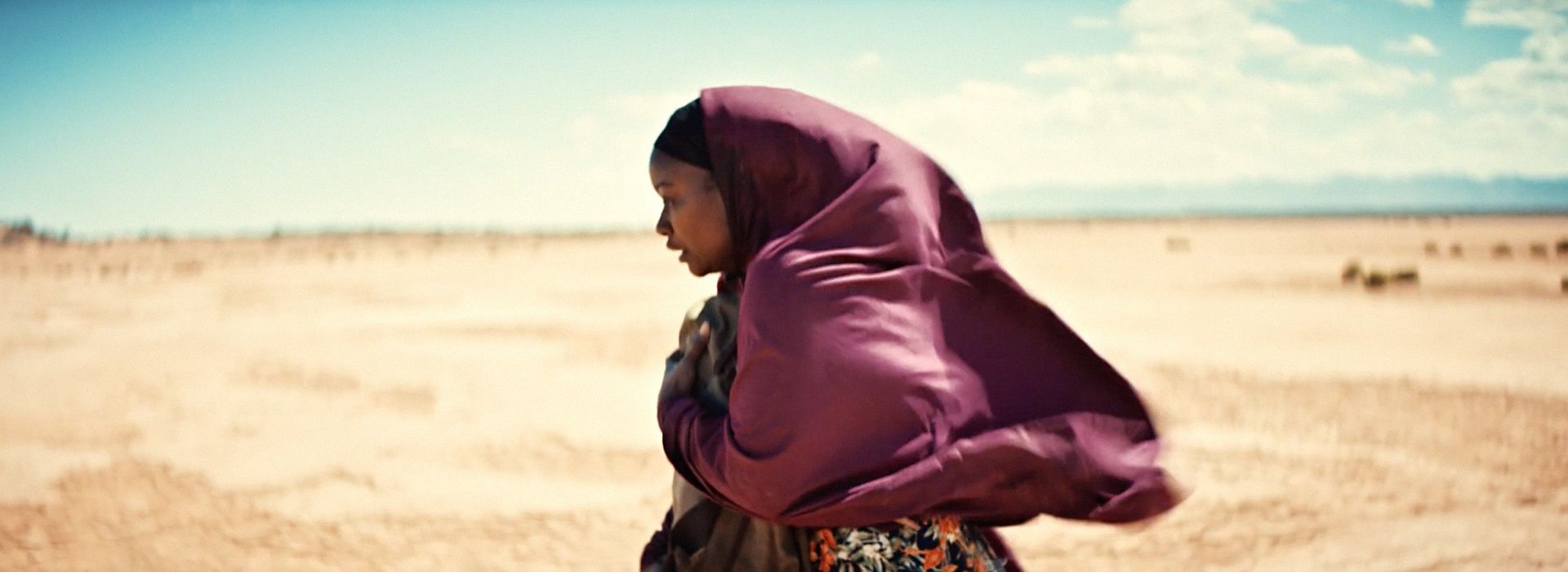Click through to Best of 2020 to discover the Newsworthy articles with greatest impact: whether by highest page views, social media engagement or reportage on important social issues.
This film asks viewers to sit within the space, fraught with uncertainty and precarity, experienced by many asylum seekers.
Review
Ayaan (15+)
Sydney Film Festival 2020 (Virtual)
Rating: Four stars (out of five)
The short film Ayaan by Australian director Alies Sluiter is quick to dive in. From its opening shot we are submerged in sound: sharp desperate breaths, water slapping, helicopter blades whirring in the distance. The soundtrack punctuates like a metronome. A woman emerges from the precarious ocean onto the vast dryness of the desert. In her arms she clutches an infant. Together they traverse the boundless landscape. The wind whistles, swaddling the woman's erratic breath. It's as though it were greeting, or perhaps, warning them.
The vastness of the landscape is reminiscent of Australia's tourism campaigns. Re-inscribing the myth of terra nullius, they suggest to prospective visitors that our endless expanses are near empty, just waiting to be explored and conquered. In such advertisements Lara Bingle assures them, ironically, that she's saved a spot on the limitless expanse of unpopulated beach, so long as they get here by plane and with pockets loaded. According to the Australian Human Rights Commission, Australia has one of the strictest immigration detention regimes in the world. Not only is detention mandatory, but it also is not time-restricted. This means anyone processed through our immigration system, including those seeking asylum, risk spending indefinite and perilous amounts of time in detention.
Ayaan offers a glimpse into the terrifying experience of many asylum seekers [and] brings to light narratives often rendered invisible.
From the outset, we sense the woman is on the run: evading persecution, yet also pursuing something, some semblance of safety perhaps, even if only for the vulnerable babe she cradles in a worn backpack on her chest. After hauling over dusty plains and pushing against the torrid wind she comes across a quintessentially Australian road sign. The silhouette of an emu signals an absurd sense of hope: an unfamiliar land of peculiar creatures.
Ayaan offers a glimpse into the terrifying experience of many asylum seekers and in doing so, brings to light narratives which are often rendered invisible. This in itself is no small feat, but what makes Ayaan special is the unfolding of a complex camaraderie between the two protagonists, Ayaan (Babetida Sadjo) and Frank (Trevor Jamieson). Sadjo and Jamieson masterfully deliver tension worthy of the film's subject matter and its associated themes of high risk.
In their first scene together, Ayaan crouches low and peers shakily through a thin veil of brittle foliage. She is watching Frank, a local Indigenous ranger with discerning eyes and a reverent grey beard, appear over a sand dune. As he approaches and stares back at her silently Ayaan rises up gingerly. They move together in cautious parallel, never letting down their gaze. Frank extends an olive branch of sorts, a modest ration of water offered in a silver lid. With thirst freshly quenched, we hear Ayaan's first word: "Perth." She has a destination in mind, something particular at stake.
The wariness that ricochets between them deepens our sense of each character's respective apprehension. The potential for either treachery or esprit de corps hangs in the balance. There's the juxtaposition of a suspicious stirring backpack and a brief, warm look of recognition; between a jolt to switch off a two-way radio and a family portrait tacked to the dashboard. Later, as we see them side by side in the car, one is always out of focus: their physical proximity is no match for the chasm of distrust between them. When Ayaan's tattered backpack begins to coo she stares back at Frank defiantly, the way only a parent protecting their own can. His hard face softens, something resonates, something shifts.
Manoeuvring through motifs of desperation, sacrifice, yearning, and solidarity, Ayaan is a visceral experience and an adept work of art. Though writer/director Sluiter is an AACTA-nominated composer, Ayaan's soundscape is fittingly sparse, incorporating only sounds that occurred naturally during filming. Footsteps, elements, breath; even the dialogue is contained. It is not until midway through the 18-minute film that we hear someone speak. Time is of the essence and each decision, every gesture, every word, is imperative.
Commendably, the film does not attempt to bring its themes to resolution, which would have been a disservice to the complexities that are set up, particularly within the limited time frame. Instead, ends are left untied and the audience is asked to sit in a sort of disquiet. This fraught space might function as a rumination on the uncertainty and precarity experienced by many asylum seekers.
Ayaan works incredibly well as a short film. Through its visceral style, one feels every desperate gaze, every gasp for breath, every impossible decision, deep down in their guts. I don't think I could've held my breath much longer than 18 minutes. Moreover, that very brevity encapsulates the urgency faced by those seeking asylum and the abruptness with which life can be changed forever.
Ayaan – Trailer – SFF 20www.youtube.com
Billy is a big art geek. They have a Bachelor's degree in Art Theory/Arts (Creative Writing & Gender Studies) from UNSW (2019-2022). In their spare time they enjoy listening to trap music and frolicking under waterfalls.






